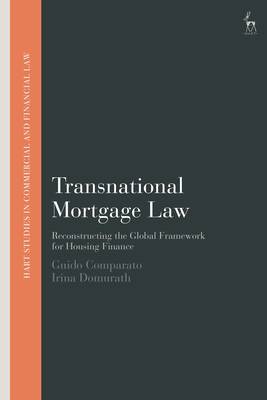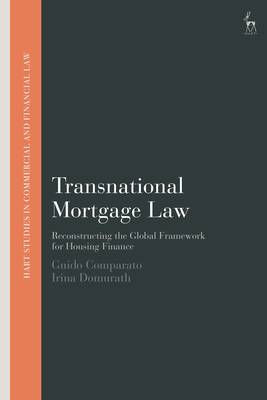
Je cadeautjes zeker op tijd in huis hebben voor de feestdagen? Kom langs in onze winkels en vind het perfecte geschenk!
- Afhalen na 1 uur in een winkel met voorraad
- Gratis thuislevering in België vanaf € 30
- Ruim aanbod met 7 miljoen producten
Je cadeautjes zeker op tijd in huis hebben voor de feestdagen? Kom langs in onze winkels en vind het perfecte geschenk!
- Afhalen na 1 uur in een winkel met voorraad
- Gratis thuislevering in België vanaf € 30
- Ruim aanbod met 7 miljoen producten
Zoeken
Transnational Mortgage Law
Reconstructing the Global Framework for Housing Finance
Guido Comparato, Irina Domurath
€ 203,95
+ 407 punten
Omschrijving
This book uncovers and reconstructs the growing body of legal principles and rules governing mortgages that have been developed by different transnational institutions and actors.
It shows how mortgages have evolved from a type of real security commonly used to facilitate lending by mitigating credit risk, to a transferable commodity with the potential to affect international financial stability and consumer welfare. In doing so, the book reveals the emergence of new policy objectives and rationales for regulation that have led to changes in the structure and functions of mortgage laws. Characterising this development as a type of transnational law, the book highlights the paradigm shifts in the law of residential mortgages brought about by their increasing global relevance. The analysis reveals tensions between the goals of risk mitigation, financial stability, consumer protection and housing justice.
The result is an innovative analysis at the intersection of contract law, property law and international financial regulation. The book portrays transnational mortgage law as a complex field governed by a plurality of socially and economically relevant but potentially conflicting goals and principles.
It shows how mortgages have evolved from a type of real security commonly used to facilitate lending by mitigating credit risk, to a transferable commodity with the potential to affect international financial stability and consumer welfare. In doing so, the book reveals the emergence of new policy objectives and rationales for regulation that have led to changes in the structure and functions of mortgage laws. Characterising this development as a type of transnational law, the book highlights the paradigm shifts in the law of residential mortgages brought about by their increasing global relevance. The analysis reveals tensions between the goals of risk mitigation, financial stability, consumer protection and housing justice.
The result is an innovative analysis at the intersection of contract law, property law and international financial regulation. The book portrays transnational mortgage law as a complex field governed by a plurality of socially and economically relevant but potentially conflicting goals and principles.
Specificaties
Betrokkenen
- Auteur(s):
- Uitgeverij:
Inhoud
- Aantal bladzijden:
- 248
- Taal:
- Engels
- Reeks:
Eigenschappen
- Productcode (EAN):
- 9781509983063
- Verschijningsdatum:
- 11/09/2025
- Uitvoering:
- Hardcover
- Formaat:
- Genaaid
- Afmetingen:
- 156 mm x 234 mm
- Gewicht:
- 526 g

Alleen bij Standaard Boekhandel
+ 407 punten op je klantenkaart van Standaard Boekhandel
Beoordelingen
We publiceren alleen reviews die voldoen aan de voorwaarden voor reviews. Bekijk onze voorwaarden voor reviews.









